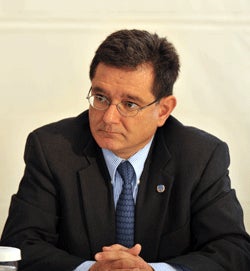In a talk at Harvard Law School on April 13, Carlos Castresana Fernandez, renowned Spanish prosecutor and head of the International Commission against Organized Crime in Guatemala (CICIG), offered an assessment of challenges facing the international body charged with investigating and prosecuting serious crime.
Castresana focused on the failures of the Guatemalan justice system and the CICIG’s efforts to lay the groundwork for peace. He delivered his remarks at an event hosted by the Advocates for Human Rights, National Security and Law Association, and the Law and International Development Society at Harvard Law School.
More than 200,000 civilian deaths—not counting 50,000 forced disappearances—were recorded during the Guatemalan Civil War from 1960 to 1996, Castresana said.
“The first failure to build peace was that no one was held accountable for a quarter of a million people,” he said. “If you kill someone in Guatemala, 96.5 percent of the time you will not be prosecuted. In the case of women who were killed, it’s 98 percent.”
Castresana pointed to both the extreme inequality among the population and the state’s poor resources as factors that created a “situation of permanent conflict” in the country.
The CICIG, Castresana said, aims to provide the country with technical assistance, legal reform proposals, and disciplinary actions to fight organized crime effectively.
“In the long term, this will be effective for Guatemala because it’s not an international community solving its problems but helping it to solve its problems,” he said.
The CICIG was established in 2008 as an independent investigative body by an agreement between the United Nations and Guatemala to assist the Guatemalan State in dismantling violent criminal organizations thought to be responsible for the widespread crime in the country’s justice and enforcement system.
Operating under Guatemalan law, the CICIG pursues independent investigations into the activities of illegal groups that infringe on the Guatemalan people’s human rights and impede efforts to strengthen the rule of law in Guatemala. The CICIG works closely with the Public Prosecutor’s Office and the National Civilian Police to develop expertise in criminal investigation and prosecution and provide assistance in tackling criminal cases.
In one year, the CICIG participated in capturing 156 individuals, Castresana said. Castresana also cited the high-profile case of Rodrigo Rosenberg Marzano, a Guatemalan attorney who arranged his own death in an attempt to effect change in his country. [See April 4, 2011, New Yorker profile]. Rosenberg received master’s degrees in law from Harvard and Cambridge University.
“What the CICIG can do in the medium and long term is create a reference of justice in order for the people to know the can live with justice,” he said. “We need a net of mutual cooperation of friendly jurisdictions for better protection of human rights.”
Castresana was appointed head of the CICIG by the Secretary General of the United Nations in September 2007. Prior to his appointment, Castresana served as prosecutor in the Superior Courts of Justice of Madrid and Catalonia as well as in the Special Prosecutor’s Offices against Drug Trafficking and against Corruption and the Public Prosecutor of the Supreme Court of Spain in 2005. Castresana also served as a Magistrate of the Territorial Court of Madrid and a District and Investigating Judge from 1986 to 1989.
Castresana, an associate professor of criminal law in the Carlos III University of Madrid, received the National Award for Human Rights in Spain in 1997 and the Human Rights Award from the Argentina Association of Human Rights in 1999. Castresana received the Medal of Honor from the Vice President of the Senate of the Republic of Chile and was awarded Doctor Honoris Causa by the Central University of Santiago Chile in 2006.
